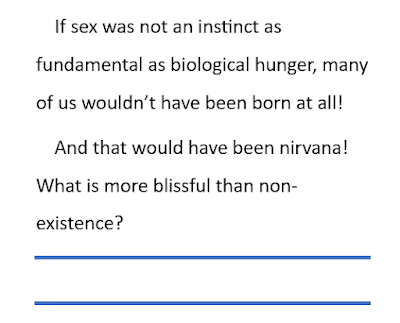Unwanted
When I was reading an article in Malayalam by Rekha K
[Bhashaposhini annual edition 2023], the question that lingered in my
mind from beginning to the end of my reading was: How many people born in
our world were actually wanted as children by their parents?
Rekha says that her birth was an
unwanted accident. She was conceived when her mother was 42 and father 59. Her
parents had six children already and they were studying in colleges or high
schools. Rekha was not expected. Rekha just happened. A freak birth. Her
siblings were not quite chuffed with the new arrival. They were teased by
friends with questions like whether their parents had no idea about birth
control methods. The aged parents too thought it was quite preposterous to have
yet another baby at their age and so they decided to abort the foetus. But the
abortion went awry! Some are fated to be born no matter what others do!
The writer goes on to say that her
parents gave her a bombastic name anyway. Maybe to make amends for their
attempt to eliminate her in her mother’s womb. Thankarekha K Menon: that was
her name in school. But she hated that label and got it cut short to Rekha K.
Even the Brahminical title of Menon was shown the door.
There were infinite number of times when the thought that I was an unwanted child arose in my mind right from childhood. Not only I but also my siblings might all have been freaks by birth. Not only my siblings and I but quite many, an astoundingly high number of, children might have been born by sheer accident in those days when birth control methods were not in common use. My parents’ religion wouldn’t have permitted them to resort to those methods anyway. The Catholic Church insists even today that every copulation must have the explicit purpose of adding to the population. Sex is meant for reproduction and any other intention will be sin. Today’s Catholics are pragmatic enough to keep the Church’s dogmas confined to the church precincts. Otherwise there would have been millions of unwanted births every year.
There are many articles in the
above-mentioned periodical expressing views similar to Rekha’s. The very first
one is written by Gracy, another eminent Malayalam writer, who begins with the
assertion that loneliness was her first inheritance as a daughter of a perpetually
quarrelsome couple. There are many more such articles in the edition whose
theme is loneliness.
If sex was not an instinct as fundamental
as biological hunger, many of us wouldn’t have been born at all!
And that would have been nirvana!
What is more blissful than non-existence?

I can only speak for my self. Both husband and I want children. But the number we at first didn't agree on.
ReplyDeleteAs child looking on my parents. Mostly my dad. Depends on his mood towards me. If I was perfect he would keep me. But if I was a slightly not the prefect person. If he could ship me off.
Coffee is on, and stay safe.
Perfection is an impossibility anyway when it comes to human lives. If only imperfections were more interesting!
DeleteI was a planned baby, in fact, i was prayed for by my parents to the Gods! With every passing day i wonder how much my mum regrets that!
ReplyDeleteHaha... That last line! Your humility makes me bow my head 😊
Delete